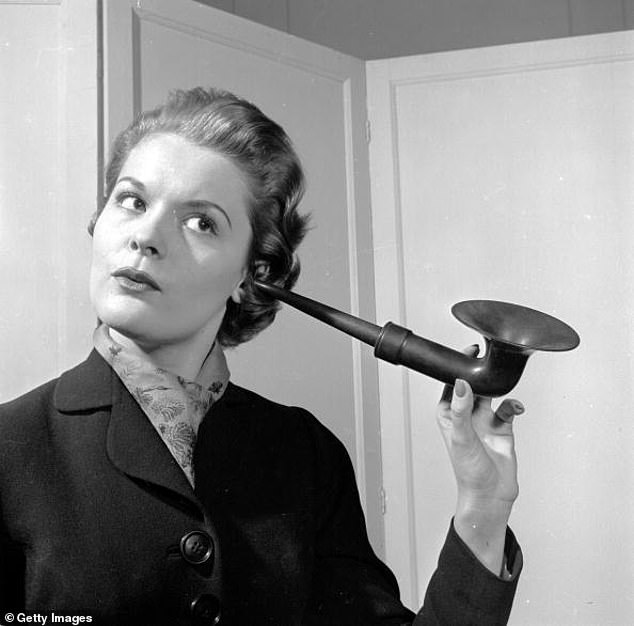When 47-year-old Caroline Norman woke up to the room spinning, a continuous ringing sound and deafness in her left ear, she knew something was wrong.
Yet she tried to carry on as normal. She recalls having to hold on to the fridge to stay upright while making her son breakfast, before staggering to the sofa.
After 20 minutes the symptoms subsided and she booked an emergency GP appointment that night. The doctor said there was nothing to worry about – the cause was a build up of ear wax. It would go away by itself, he reassured her.
A month passed and, still unable to hear out of her left ear, Caroline booked an appointment with an audiologist.
They saw no sign of infection or blockage so referred Caroline to a specialist at the local hospital. That was when the true cause of her symptoms was revealed – sudden sensorineural hearing loss.
‘I nearly passed out when they told me,’ said Caroline. ‘I was so surprised, especially after being told it was just ear wax.’
Worse still, she had missed the crucial window – within a week of first experiencing symptoms – to receive the treatment that can prevent deafness. Her hearing loss would, they said, be permanent.
‘There was of course the initial shock, and the frustration of a delayed diagnosis, but then came the grief,’ says Caroline, a psychotherapist from Essex.

Caroline Norman, who had sudden hearing loss which the doctor said was ear wax build up
‘Everyone saw me the same way, but it had a huge effect on me for six months. I lost a lot of confidence initially, particularly socially, I really did not want to have to tell people about my hearing loss.
‘I have learned to come to terms with it but I still wish I could hear that song the way I used to, or hear that family member who is talking quietly.’
Now Caroline says she has managed to make small adjustments to day-to-day life to help her, such as positioning herself on the right-hand side of a social group.
Collating her advice for people with the condition she has just written Sudden Hearing Loss: Stories Of Hope, Guidance, And Support to help others who have suffered from sudden hearing loss.
She says the biggest challenge is that she struggles to hear where a sound is coming from, so finding a phone when it is ringing or crossing the road can be a problem.
Sudden sensorineural hearing loss is a rapid, unexplained loss of hearing – usually affecting one ear – that comes on over the course of hours or days. It is considered a medical emergency, as prompt treatment with steroids – drugs that dampen inflammation – within 48 to 72 hours can significantly improve the chances of recovery. In most cases, the cause is never found. However, experts believe it may be triggered by viral infections, autoimmune reactions, or disruptions in blood flow to the inner ear.
Less commonly, it can be caused by benign tumours, head trauma, or side-effects of some medications. Other common symptoms include vertigo, tinnitus and difficulty with speech.
‘While we do not know what fully causes sudden hearing loss, we do believe is likely a combination of a variety of conditions,’ says Professor Nish Mehta, chairman of the Ear Institute at University College London.
‘One of the strongest hypotheses is that viral infections are often the cause, particularly in patients under 40, but hearing loss is likely to occur between a week and three after feeling ill, not straight away.
‘The other cause, often in older patients, is a change in blood flow. In the brain this would be known as a stroke, but in the ear it causes this condition. This is important because it can also be a marker of potentially cardiovascular problems down the line that require further medical examination.’
It is estimated up to 15,000 people suffer from the condition each year in the UK. Last year researchers at University College London Hospitals found there was a critical window for administering steroids.

‘While we do not know what fully causes sudden hearing loss, we do believe is likely a combination of a variety of conditions,’ says Professor Nish Mehta
To prevent permanent damage the drugs have to be administered within seven days of symptoms developing, but the ideal time was 72 hours, the team discovered.
Yet they also found that only about 60 per cent of these patients were treated within a week.
‘There is a real lack of awareness of the condition among patients and even some medical professionals,’ says Professor Mehta. ‘Often we see patients who have sat on this for a couple of days and then we are halfway through the critical window for treatment – this is a medical emergency and patients need to be persistent.’
To ensure that patients are able to seek urgent medical attention, experts say that there are key symptoms that can help distinguish between sudden hearing loss and more benign problems.
‘Often people will wake up with the hearing loss, but it may also be gradual over three days when the patient is awake,’ says Franki Oliver, who is audiology manager at RNID, a hearing loss charity.
‘We often find patients also experience a popping sound as well. Generally the changes in hearing happen on one side, it is rarely in both. Other symptoms include sudden tinnitus or a loss of balance, vertigo.’
Experts say that anyone experiencing these symptoms must act quickly. ‘You need to pursue an answer and get help as quickly as you can, do not be put off by being unnecessarily concerned, it is a medical emergency,’ says Ms Oliver.
‘A patient’s first port of call should be their GP, but if they are particularly concerned or cannot get an appointment then they should go to A&E.’












